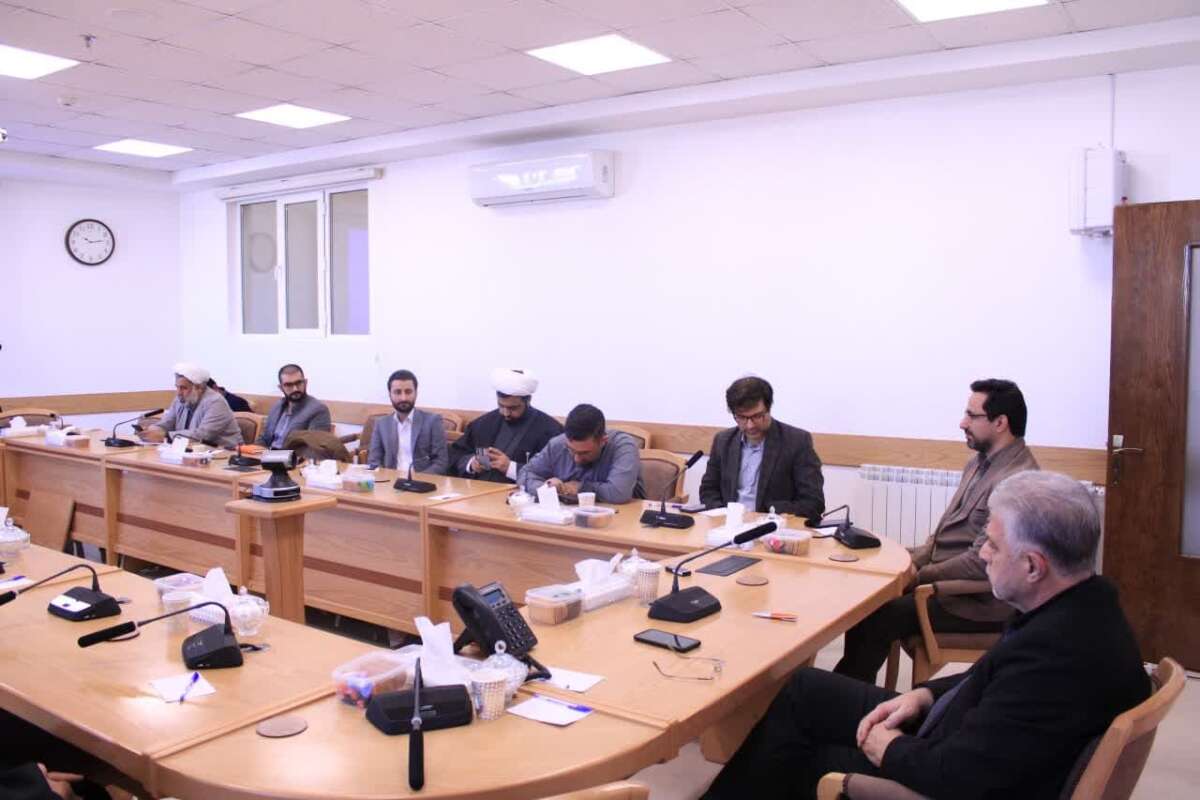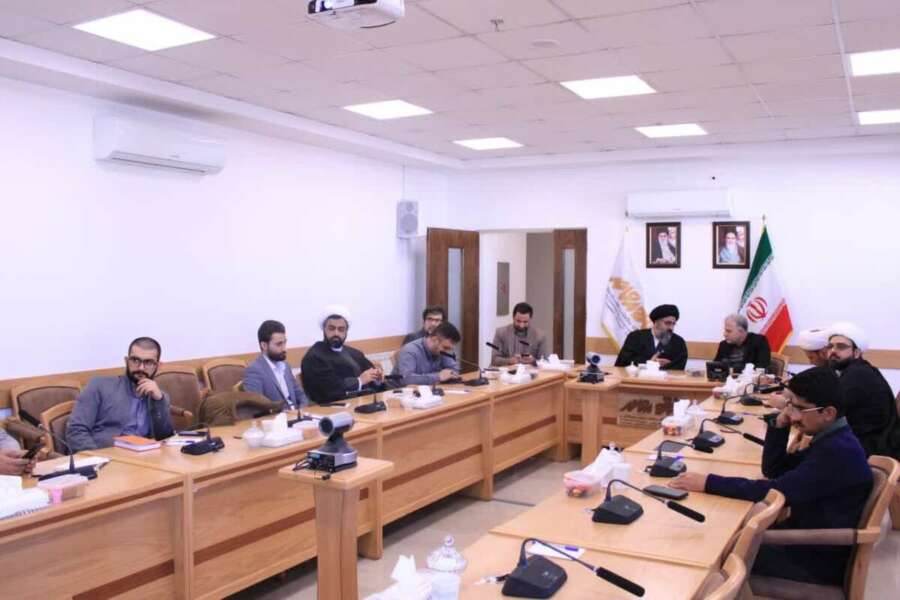A discussion session on “Jurisprudence Studies and Knowledge Capacities in the International Arena” was held on Thursday, December 19, with the presence of Shaykh Mahdi Al-Sumayda’i, Grand Mufti and Chairman of the Iraqi Sunni Council, Dr. Sayyid Sadiq Haqiqat, a faculty member of the Imam Khumayni and Islamic Revolution Research Institute, Shaykh Abdul Qadir Yusuf Al-Tarnini, a faculty member of the Lebanese University, Dr. Abedin Mu’meni, a faculty member of the University of Tehran, Dr. Mahmud Shafi’i, a faculty member of the Mufid University of Qum, and Dr. Mustapha Khurram Abadi, a researcher in the Islamic Jurisprudence Department, hosted by the Center for Contemporary Jurisprudence Studies.
At the beginning of the meeting, Dr. Khurram Abadi, the secretary of the meeting, said: The questions and challenges raised by the teachers present at the meeting are a background that will make the fruit of today’s discussion more fruitful.
Then, Dr. Haqiqat made some points by giving an introduction about the assumption of the existence of capacities and limitations of jurisprudence and its function in relation to individuals and groups, especially in the international arena.
He stated that does the scope of jurisprudence include social, political issues and issues related to the system? Do we have a jurisprudence of the system and a jurisprudence of governance? Can jurisprudence also enter and rule in structures?
Second point: Imam Khumayni (may Allah have mercy on him) established a structure as a reforming council of the system with two jurisprudential titles (the absolute guardianship of the jurist and the discussion of expediency), which itself becomes the basis for governance.
In stating the third point of his points, he said: It may be possible to claim that jurisprudence is not indifferent to issues related to the international arena. For example, what will our relations be with infidel and non-infidel countries? Is there a possibility of dialogue with infidel and non-infidel countries? In jurisprudence, what are the rulings on topics such as Dar al-Islam and Dar al-Kufr, martyrdom operations, initial jihad, etc.?
Fourth point: What is the relationship between Islamic countries in particular?
Fifth point: To what extent is it necessary to recognize the comprehensive cognitive form of the value of authorities in society and to govern them?
And finally, some points were made, including the scientific relationship of jurisprudence with other sciences, the lack of response of jurisprudence to all social issues such as the theory of peace and the theory of the state (we have a passage about peace and the state, but we do not have a theory), the difference in approaches to religion and jurisprudence (maximum-minimum-intermediate), interaction with discourses that believe in the lack of validity of jurisprudence, such as enlightened Muslims in other countries, and recognizing the comprehensive cognitive form of other countries and discourses that are our competitors regarding the limitations of jurisprudence.
Finally, it was stated that recognizing and paying attention to the capacities and limitations of jurisprudence will make it more effective in the international arena.
Then, Dr. Abedin Mu’meni, a teacher at the University of Tehran, presented his views on the demarcation of the Islamic Ummah with other Ummahs by the Prophet (s) upon his arrival in Medina, and made some points about the scope of the Shari’ah and the scope of the Islamic ruler’s authority in the lands of disbelief.
In the beginning of his presentation, Dr. Al-Tarnini made some points about how the first differences in ijtihad emerged in the era of the Prophet (s) in the case of Banu Qurayzah, adding: I believe that the criticisms that the Imamiyyah scholars have on the Sunni narrations are very advanced criticisms, and Lady al-Zahra’ (‘a) has been the standard bearer of Shi’ah criticisms on the Sunnis, according to the Fadak case. Finally, referring to a narration of the Prophet (‘a) who said, “Do not tell lies about me,” he concluded that the way out of the differences between Shi’is and Sunnis is to uncover these lies in a logical way.
Dr. Shafi’i continued by referring to the methodology in ijtihad and stating the problems of the textualist method, including the lack of response to many new and contemporary issues, and considered discovering the intentions of the Shari’ah as the solution to complete the shortcomings of this method.
The Grand Mufti and Chairman of the Iraqi Sunni Council, Shaykh Mahdi Al-Sumaida’i, also referred to the relationship between Muslims and how to cooperate in international relations in his good speech. According to the narration of the Prophet (s), despite knowing the beliefs of 73 sects, he considered the condition of Islam to be only the two testimonies and no other condition, and he believed that a person who becomes a Muslim has financial and life immunity.
At the end of this discussion, Ayatullah Sayyid Mujtaba Nur Mufidi, while appreciating the valuable efforts of Shaykh Mahdi Al-Sumaida’i to strengthen Islamic unity and support the resistance front against the Israeli aggressor regime, said: Today, there are many areas at the international level that require the serious presence of religious scientific centers and seminaries to explain innovative and path-breaking ideas.
The head of the Contemporary Jurisprudence Research Center added: “The joint scientific efforts of Muslim scholars on issues such as the environment, food security, foreign interventions by powers in independent and Muslim countries, air pollution, energy, as well as knowledge related to the humanities, while helping to produce pure and path-breaking ideas in these problems, will further strengthen Islamic unity.”


